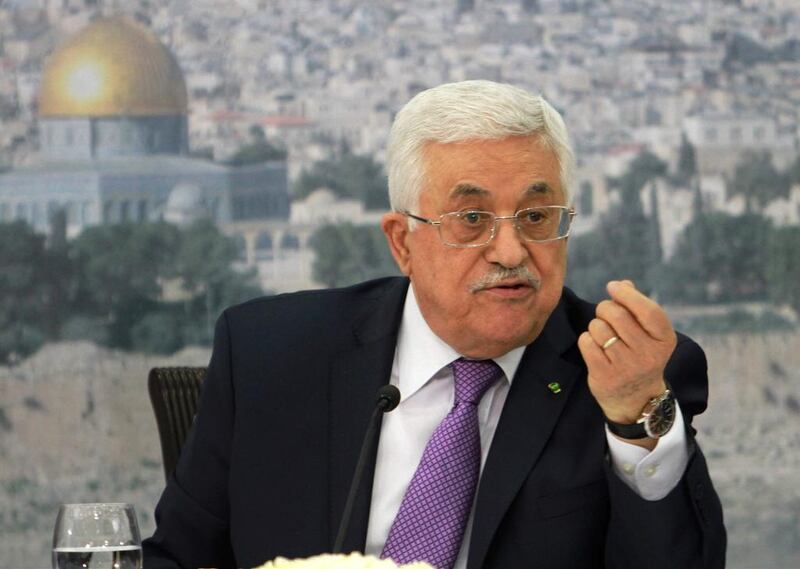Palestinian president Mahmoud Abbas could intensify Palestine’s unilateral push towards statehood by asking for a deadline to end the Israeli occupation of the West Bank at the UN General Assembly this month.
Palestine’s ambassador to the UN, Riyad Mansour, said this weekend that Mr Abbas could use the UN to ask for a timeline for Israeli withdrawal, and threaten to pursue Palestinian membership to the International Criminal Court if the demand is ignored or refused by Israel and its international allies.
Mr Mansour said that Mr Abbas had been buoyed by the Palestinian Authority’s role in ending the 50-day war between Israel and Palestinian militants in the Gaza Strip, as well as increasingly frustrated by the failure of peace talks to secure any real progress towards the establishment of an independent Palestinian state.
"We want a date for the end of occupation — that's the new idea," Mr Mansour said, in The New York Times.
He said if Israel and the international community continued to thwart Palestinian efforts towards statehood, Palestine could gradually move towards establishing itself as a state, “through joining all these agencies, through joining all these treaties, through joining all these conventions and conferences, and also seeking everything that is available to us on the legal front, including the ICC”.
After the failure of peace talks this year and before the latest war in Gaza, Mr Abbas signed 15 international treaties at the UN, but the Palestinian president has so far shied away from pushing forward with ICC membership, which would enable Palestine to take Israel to court over both the occupation and war crimes.
Israel, the US and some European states have used a combination of sticks and carrots in their attempts to persuade Mr Abbas not to pursue membership of the ICC. Last year, Israel released 104 prisoners in return for Mr Abbas shelving the move, while this year the Israelis refused to continue the US-sponsored peace talks because Mr Abbas signed the 15 UN treaties.
But Palestinian officials admit that there are political reasons within Palestine for putting off the application. The fear is that Israel could demand that members of militant groups such as Hamas and Islamic Jihad — the former now part of the Palestinian unity government — also appear before the ICC.
"Mahmoud Abbas is responsible for more than just his friends, he is responsible for the whole Palestinian people. The ICC is the last card we have to play … (and) the only reason it hasn't been used until now … is that all the Palestinian political parties have to agree. It is very risky," said Akram Al Rjoub, the governor of Nablus, in a recent interview with The National.
Hamas said during the Gaza war that it would back a Palestinian ICC membership move, a month after Mr Abbas secured the written support of all the parties that make up the Palestinian Liberation Organisation (PLO). But the more extreme groups, particularly in Gaza, are unlikely to back a move that could land their leaders in the dock.
At the same time, analysts argue that the accession to the criminal court by Palestine could be carried out in a way as to avoid action by Israel against Palestinian militants for past attacks. The membership could be forward looking only, meaning that it would only apply to future crimes — which, the Palestinians would argue and international law would agree — would include settlement activity in the West Bank.
“This would mean that Israel and Hamas would not face any charges unless they commit genocide, war crimes, or crimes against humanity after the instrument of accession takes effect,” said Victor Kattan, a fellow at the law faculty of the National University of Singapore and a policy adviser to Al Shabaka, the Palestinian Policy Network.
“This would also mean that the ICC would not be able to examine crimes that took place during the recent conflict in the Gaza Strip unless Israeli soldiers and Hamas fighters implicated in war crimes have dual nationality.”
Whatever occurs in the run up to the UN General Assembly, the future is very much in the PA's hands, as was argued in a rare opinion piece by the ICC's new prosecutor, Fatou Bensouda, in the Guardian this weekend.
She said that the decision as to whether to give the ICC jurisdiction in Palestine was for Palestinian leaders alone to make: “I cannot make it for them”, she wrote.
foreign.desk@thenational.ae





